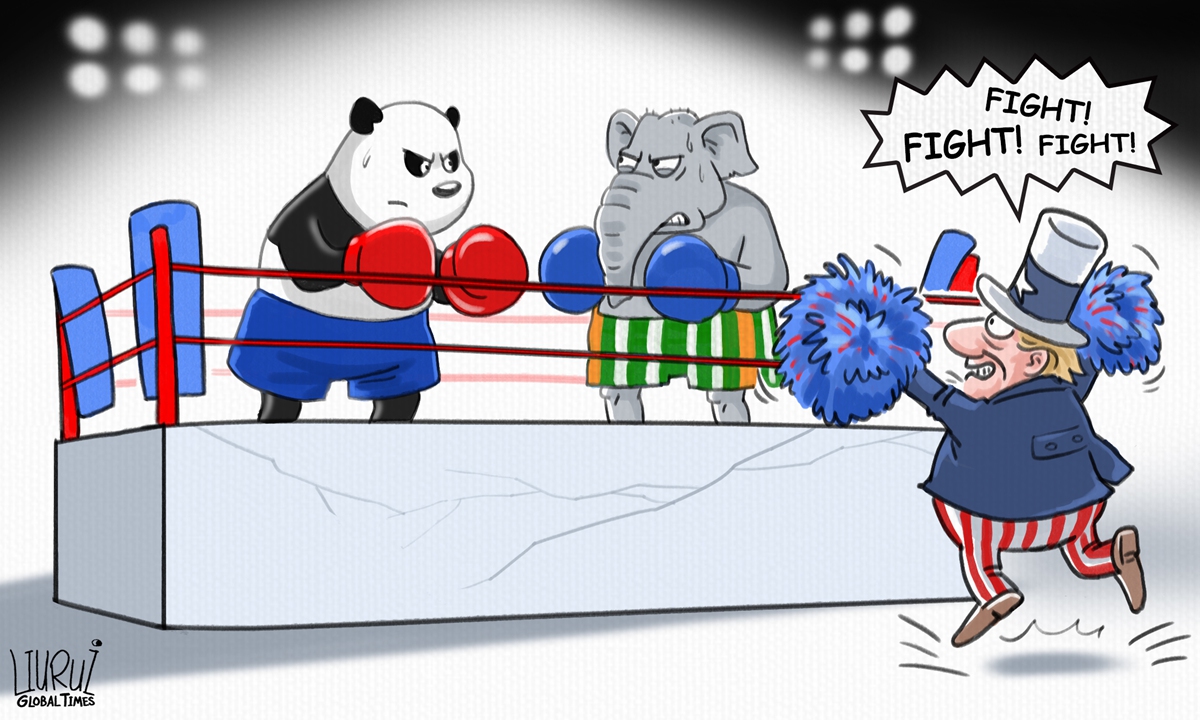US provocation won’t do much to chill already downbeat China-India talks: analysts

China India Photo: GT
US Secretary of State Mike Pompeo's allegation that 60,000 Chinese soldiers are amassed along the China-India border is like throwing a smoke bomb toward India, Chinese analysts said, but the attempt to sow discord cannot further dampen the already sour China-India talks scheduled for Monday.
After Pompeo's return from the Quad ministerial meeting in Japan, the top US diplomat hit out at China on several occasions, claiming that "Indians are seeing 60,000 Chinese soldiers on their northern border." His allegation came ahead of the 7th China-India military commanders' meeting on Monday and the official visit of US Deputy Secretary of State Stephen Biegun to India on Monday.
Chinese observers reached by the Global Times pointed out that the allegation provided an excuse for India ahead of the talks, a meeting that India is not in the mood to deal with when its number of domestic COVID-19 infections has topped 7 million and the country is suffering a sluggish economy.
Hu Zhiyong, a research fellow at the Institute of International Relations of the Shanghai Academy of Social Sciences, told the Global Times on Sunday that the US sharing of such exaggerated and unreliable military intelligence is only aimed at roping in India in the deployment of its Indo-Pacific Strategy, which aims to contain China.
"By throwing such a smoke bomb, the US is trying to impress on India that the two [of them] are allies, but when the real China-India military conflict breaks out, the US won't entirely stand on India's side. The so-called alliance exists on the basis of nothing more than shared economic interests in the arms trade," Hu said.
Chinese analysts generally believe that no positive result will come from the Monday military talks between China and India, and the provocation from the US will further prompt India to insist on the status quo.
Zhao Gancheng, director of the Center for Asia-Pacific Studies at the Shanghai Institute for International Studies, told the Global Times Sunday that "India has never shown any signs of intention to resolve the military standoff along the border, thus the US's move to sow discord will neither alter India's stubborn position nor further damage the already downbeat China-India talks."
Although India and China have already held a series of diplomatic and military talks, India has continued to pile up its deployment of military forces, and even advocated building roads and opening the Atal Tunnel at Rohtang to enhance India's combat capability.
Given the dire domestic situation in India, which has seen over 7 million people confirmed to be infected with the novel coronavirus and the country suffering a high unemployment rate, it is possible that India is using the border conflict with China to divert domestic attention from these problems, Hu noted.
India may be borrowing some ideas of the US to meet their own requirements, such as taking this intelligence offered by the US as a bargaining chip during talks with China and inciting domestic anti-China sentiment, but it does not want the US to play a role in its disputes with China, experts said.